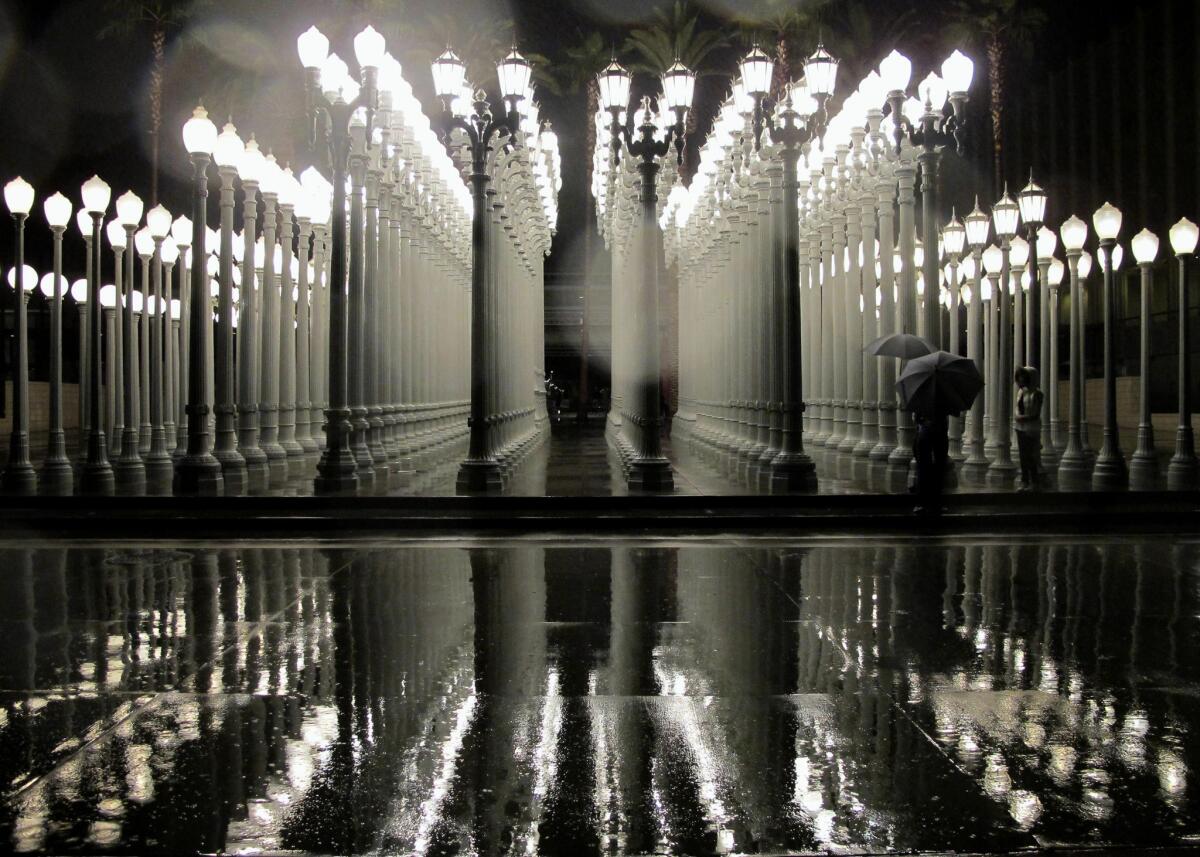Roundup: Chris Burden passes, Venice Biennale-palooza, Googleplex shrinks

Iconoclastic Los Angeles artist Chris Burden has passed away. His sculpture, “Urban Light,” seen here on a rainy night at the L.A. County Museum of Art in 2010, has become a symbol of the city.
- Share via
So much of the art world is boating around Venice for the Biennale, roaming through galleries and falling into the drink — which means there are lots of stories emerging from Venice about art, politics, protest and the meaning of it all.
Plus: Google’s grand campus plans get an ego-check, Sofia Coppola is opposed to the Frick Museum’s expansion and there are conservation chills and thrills in Europe. Hitting much closer to home, the inimitable L.A. sculptor and performance artist Chris Burden has passed away. Here’s what we have in Roundup:
— “He explored the realm of science and technology as distinctly modern manifestations of power’s dual capacity for the creation of magical delight or total annihilation.” Ground-breaking Conceptualist Chris Burden has died at age 69. Christopher Knight has the obit.
— Related: Roger Ebert’s must-read essay about seeing one of Burden’s endurance performance pieces at the Museum of Contemporary Art in Chicago. And MOCAtv’s interview with the artist — featuring video from his late-night ads. (ARTnews)
— Follow the money: Private art dealers are playing an ever bigger role in staging exhibitions such as the Venice Biennale. The Art Newspaper reports.
— Speaking of which: Labor activists occupied the dock at the Peggy Guggenheim Collection in Venice to protest the treatment of migrant workers on the rising new Guggenheim outpost in Abu Dhabi. This follows their shutdown of the Gugg in New York on May 1. In addition, protesters also greeted the opening of Expo Milano last week.
— The Venice Biennale’s core show, incidentally, curated by Okwui Enwezor, is preoccupied with questions of labor and politics. And critic Benjamin Genocchio is not that into it. Sample quote: “We all know the market is a force in contemporary art-making and so to ignore the broader implications on art of this fact seems, well, unhelpful and naive.” In other words: it’s, like, totally hard to drink champagne when there’s no shiny stuff around.
— One more from Venice: Cristina Ruiz has a wonderfully saucy essay on how no one should confuse the act of looking at political art in Venice with “the illusion of action.” Also worthwhile, this essay by JJ Charlesworth on how art-world hypocrisy is really the star of the show.
— A group of 54 artists — among them filmmaker Sofia Coppola and photographer Cindy Sherman — has signed a letter in opposition to the expansion of the Frick Museum in New York.
— Arun Venugopal of WNYC has a story on the whiteness of museums, tied to Michelle Obama’s statements at the opening of the new Whitney Museum.
— Google’s grand campus plans have been struck down by the Mountain View City Council in favor of a proposal by LinkedIn. Total tech-block.
— In Tehran, replacing advertising billboards with art. (ARTnews)
— From the annals of conservation: Regular conservation work on a painting in England uncovers a painting by Titian, while a botched restoration job in Turkey has left a bunch of Roman mosaic figures looking like they’ve had Beverly Hills levels of plastic surgery. (Art F City)
— L.A. forgot to landmark the Parker Center. Oops.
— Jacob Lawrence’s lost wartime paintings.
— L.A. Weekly has a short profile of artist Zachary Drucker, who serves as adviser on Amazon’s “Transparent” series.
— Norman Braman is a muckety-muck in the Miami art scene. He is also the moneybags behind GOP Sen. Marco Rubio.
— Why is so much architecture junk? Critic Mark Lamster has a few ideas.
— A preview of the Japanese American National Museum’s newly acquired internment camp objects.
— Since the 1920s, a Japanese American family has occupied a historic bungalow in a corner of the Scripps estate in Altadena. Now the owner of the property — the Pasadena Waldorf School — wants them out. (Esotouric)
— Whole Foods has unveiled plans for a line of stores geared at more economy-minded shoppers. Kriston Capps over at City Lab argues that this should include customers on food stamps.
— And last but not least, how Old Robot looks at art.
Find me on the Twitters @cmonstah.
More to Read
The biggest entertainment stories
Get our big stories about Hollywood, film, television, music, arts, culture and more right in your inbox as soon as they publish.
You may occasionally receive promotional content from the Los Angeles Times.











